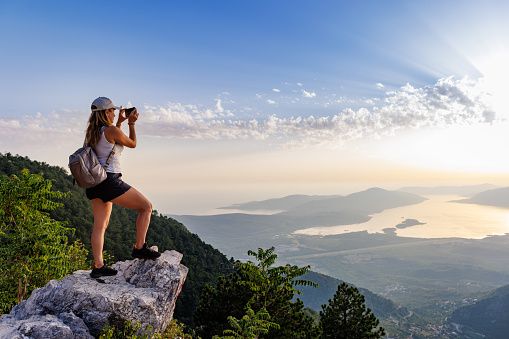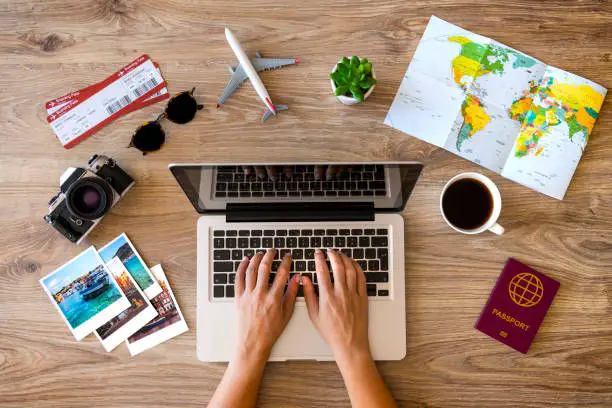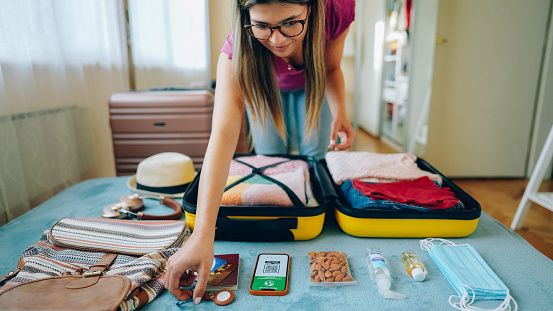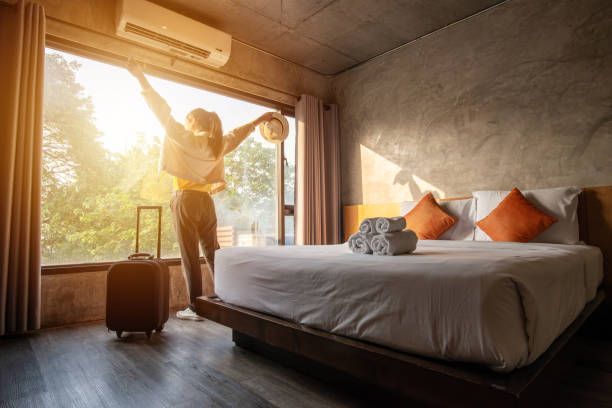Tips For Solo Female Travelers

The world is full of beautiful places waiting to be explored, and traveling is an excellent way to discover them. While many people prefer to travel with friends or family, there is a growing trend of solo travelers who choose to venture out alone.
Solo travel is a unique experience that allows you to discover new places, meet new people, and learn more about yourself in the process.
One of the significant advantages of solo travel is the freedom it provides. When traveling alone, you have complete control over your itinerary, allowing you to explore at your own pace and make spontaneous decisions.
You don't have to worry about compromising with other travelers or missing out on opportunities because of conflicting schedules. Solo travel allows you to be fully immersed in your journey, experiencing everything your destination has to offer on your terms.
Solo travel also provides an opportunity for personal growth and self-discovery. When you travel alone, you are forced to confront challenges and overcome obstacles on your own, which can be a powerful learning experience.
You have to rely on yourself, which can help you build confidence and resilience. Solo travel can also be a time for introspection, allowing you to reflect on your life and gain a new perspective.

Another benefit of solo travel is the opportunity to meet new people. When you travel with others, you tend to stick to your group, but when you're alone, you're more likely to strike up conversations with locals and fellow travelers.
This can lead to meaningful connections and friendships, adding to the richness of your travel experience. Solo travel also allows you to be more approachable, which can lead to unique opportunities and experiences.
However, solo travel does come with its own set of challenges. Safety can be a concern, especially for solo female travelers. It's essential to research your destination before you go and take precautions to stay safe while you're there.
You may also experience loneliness or homesickness, especially if you're traveling for an extended period. It's important to stay connected with loved ones back home and to find ways to meet new people while you're on the road.
Overall, solo travel is a unique and rewarding experience that can provide personal growth, new connections, and unforgettable memories.
If you're considering traveling alone, take the time to research your destination, plan your itinerary, and prepare for the challenges that may come your way. With a bit of preparation and an open mind, solo travel can be one of the most fulfilling experiences of your life.
Tips for solo female travelers
Traveling alone can be an exciting and liberating experience, but it can also be daunting, especially for women.
As a solo female traveler, you have to be extra vigilant about your safety and take additional precautions to ensure a smooth and enjoyable journey.
Here are some tips for solo female travelers to help you stay safe and make the most of your adventure.
1. Research Your Destination

Researching your destination is one of the most important steps you can take to prepare for a trip, whether you're traveling domestically or internationally. Here are some tips on how to research your destination effectively:
Check the travel advisory: Check the travel advisory provided by your government before you book your trip. This will give you an overview of any safety concerns or political issues in the area you plan to visit.
Research the culture: Learning about the culture, customs, and traditions of your destination will help you understand how to behave and avoid cultural faux pas. Look for information on dress codes, tipping etiquette, and local customs.
Learn the language: Even if you don't become fluent in the local language, learning a few key phrases can go a long way in making a good impression and communicating effectively with locals. Consider using language learning apps or hiring a tutor to help you prepare.
Read travel guides: Travel guides provide valuable information on the top attractions, restaurants, and accommodations in your destination. Look for guides that are up-to-date and cover a wide range of topics.
Check travel forums: Online travel forums, such as TripAdvisor or Lonely Planet, can be an excellent resource for getting advice from other travelers who have visited your destination. Look for forums that are active and have a community of knowledgeable travelers.
Research transportation: Research the transportation options available in your destination, including public transportation, taxis, ride-sharing apps, and car rentals. Familiarize yourself with the local transit system and how to navigate it.
Check the weather: Checking the weather forecast for your destination will help you pack appropriately and plan your itinerary. Consider the time of year you plan to visit and any seasonal events or festivals that may affect your trip.
Look for local events: Check local event calendars to find out about festivals, concerts, or cultural events happening during your visit. This can add to your trip's experience and provide opportunities to connect with locals.
By taking the time to research your destination thoroughly, you can have a safer and more enjoyable travel experience. Remember to be flexible and open-minded, as unexpected surprises and challenges are a natural part of travel.
2. Pack Smart

Packing smart is essential for any travel experience, especially when you're traveling alone. Here are some tips on how to pack smart for a solo trip:
Make a packing list: Start by making a packing list that includes everything you need to bring with you on your trip. This will help you stay organized and ensure you don't forget any essentials.
Pack light: Traveling light can make your trip more comfortable and stress-free. Stick to the essentials and avoid overpacking. Choose versatile clothing items that can be mixed and matched and avoid bringing duplicates.
Bring comfortable shoes: When traveling alone, you'll likely be doing a lot of walking, so it's important to bring comfortable shoes. Choose shoes that are comfortable, durable, and appropriate for the activities you have planned.
Use packing cubes: Packing cubes can help you stay organized and save space in your luggage. Use them to group similar items together, such as clothing or toiletries.
Bring a daypack: A small daypack can be a lifesaver when you're out and about exploring. Use it to carry essentials such as water, snacks, a map, and a guidebook.
Pack a first aid kit: A basic first aid kit can come in handy in case of emergencies. Include items such as bandages, pain relievers, and antiseptic wipes.
Bring a portable charger: Staying connected is important when traveling alone. Bring a portable charger to ensure your phone or other devices are always charged and ready to use.
Use travel-sized toiletries: Bring travel-sized toiletries to save space and avoid carrying heavy bottles. You can also purchase toiletries at your destination if needed.
By packing smart for your solo trip, you can reduce stress and enjoy your adventure to the fullest. Remember to pack light, stay organized, and bring only what you need.
3. Dress Conservatively

Dressing conservatively is important when traveling, particularly for solo female travelers. It can help you blend in with the locals, avoid unwanted attention, and show respect for the local culture. Here are some tips on how to dress conservatively when traveling solo:
Research local customs: Research the local dress customs of your destination. In some countries, it's expected that women dress modestly, covering their shoulders and legs. In other places, there may be specific clothing items that are considered inappropriate.
Cover up: Consider covering your shoulders, chest, and legs with clothing that is loose-fitting and comfortable. This can help you avoid unwanted attention and show respect for local customs.
Choose neutral colors: Choose clothing items in neutral colors that are easy to mix and match. This can help you blend in with the locals and avoid standing out as a tourist.
Avoid flashy jewelry: Avoid wearing flashy or expensive jewelry that can attract unwanted attention. Instead, wear simple and understated pieces.
Wear comfortable shoes: When traveling, you'll likely be doing a lot of walking, so it's important to wear comfortable shoes. Choose shoes that are appropriate for the activities you have planned and comfortable enough to wear all day.
Carry a scarf or shawl: Bring a scarf or shawl that you can use to cover your head, shoulders, or legs if needed. This can be especially useful when visiting religious sites or other places where modest dress is required.
Dress in layers: Dressing in layers can help you adjust to changes in temperature and weather conditions. This can also help you avoid packing too much clothing and keep your luggage light.
By dressing conservatively when traveling solo, you can blend in with the locals, avoid unwanted attention, and show respect for local customs. Remember to research local customs and dress appropriately for your destination.
4. Stay Connected

Staying connected while traveling is important for both safety and convenience. Here are some tips to consider:
Get a local SIM card: Consider purchasing a local SIM card for your phone so that you can have access to a local phone number and data plan. This will allow you to make local calls, use GPS, and access the internet while on the go.
Use a messaging app: Download a messaging app such as WhatsApp or Viber that allows you to send messages and make calls over the internet. This will allow you to stay in touch with friends and family back home without incurring expensive international roaming charges.
Use public Wi-Fi cautiously: Be cautious when using public Wi-Fi, as it may not be secure. Avoid logging into sensitive accounts such as online banking or email on public Wi-Fi networks.
Keep a backup charger: Make sure to bring a backup charger for your phone or other devices in case your battery runs low.
Consider a portable Wi-Fi hotspot: If you need to stay connected while on the go, consider purchasing a portable Wi-Fi hotspot. These devices provide a secure Wi-Fi connection and can be used with multiple devices.
Keep important documents with you: Keep important documents such as your passport and travel insurance with you at all times, in case you need to access them while on the go.
Remember, staying connected can make your travels more enjoyable and convenient, but it's important to take precautions to protect your personal information and stay safe.
5. Trust Your Instincts

Trusting your instincts is crucial when it comes to staying safe while traveling. Here are some tips on how to listen to and trust your instincts:
Pay attention to your gut feelings: Your gut feelings are often the first indication that something may be off or potentially dangerous. If something feels wrong or uncomfortable, listen to your intuition.
Observe your surroundings: Be aware of your surroundings and any potential threats. Look for signs of danger, such as suspicious individuals or unmarked vehicles.
Evaluate the situation: Evaluate the situation and consider whether it is safe to continue or whether you should remove yourself from the situation. Trust your instincts and make a decision based on what feels right.
Have an exit strategy: Always have an exit strategy in place in case of an emergency. Know where the exits are, have a plan for how to get out quickly, and be prepared to act if necessary.
Don't ignore warning signs: Don't ignore warning signs or rationalize potentially dangerous situations. If something feels off, it's better to err on the side of caution and remove yourself from the situation.
Remember, your instincts are your body's way of telling you that something is not right. Trusting your instincts can help you stay safe and avoid potentially dangerous situations while traveling.
6. Stay in Safe Accommodations

Choosing safe accommodations is an important part of staying safe while traveling. Here are some tips for selecting safe accommodations:
Do your research: Research potential accommodations before you book. Look for reviews online and ask for recommendations from friends or family who have traveled to the same destination.
Choose reputable accommodations: Choose accommodations that are well-known and reputable, such as well-reviewed hotels, hostels or guesthouses. These establishments are more likely to have security measures in place.
Look for safety features: Look for accommodations that have safety features such as secure locks on doors and windows, well-lit hallways and parking areas, and surveillance cameras.
Avoid staying in remote areas: Avoid staying in remote areas or accommodations that are located in sketchy or dangerous neighborhoods.
Use a door stopper or travel lock: Consider bringing a door stopper or travel lock to add an extra layer of security to your accommodation.
Keep your valuables safe: Use the safe provided in your room to store your passport, cash, and other valuables.
Check for emergency information: Before you check in, make sure you know what to do in case of an emergency. Find out where the emergency exits are located, and ask about the hotel’s emergency procedures.
Note, staying in safe accommodations is an important part of staying safe while traveling. By doing your research and choosing reputable accommodations with safety features, you can ensure a more enjoyable and secure trip.
7. Connect with Other Female Travelers

Connecting with other female travelers can be a great way to stay safe and make new friends while traveling. Here are some ways to connect with other female travelers:
Join a female-focused travel group: There are many female-focused travel groups and organizations that can help you connect with other like-minded travelers. Some examples include Girls Love Travel, Wanderful, and Women Who Travel.
Use social media: Social media platforms such as Instagram and Facebook can be great resources for connecting with other female travelers. Join travel-related groups or use hashtags to find other travelers who share your interests.
Attend events and meetups: Attend travel-related events and meetups to meet other female travelers in person. Check out local events or international conferences to connect with other travelers.
Stay in female-only accommodations: Consider staying in female-only accommodations such as hostels or guesthouses. These types of accommodations can be a great way to meet other female travelers in a safe and supportive environment.
Take a group tour: Joining a group tour can be a great way to meet other travelers and explore new destinations. Look for tours that are specifically designed for women or that have a high number of female participants.
Connecting with other female travelers can be a great way to stay safe and make new friends while traveling. By joining female-focused travel groups, attending events and meetups, and staying in female-only accommodations, you can create a supportive network of fellow travelers.
Conclusion
Solo female travel can be an incredibly empowering and rewarding experience, but it's important to take the necessary precautions to ensure your safety.
By staying connected, trusting your instincts, choosing safe accommodations, and connecting with other female travelers, you can minimize your risks and make the most of your adventure.
Remember to always prioritize your safety, and have fun exploring the world on your own terms!
